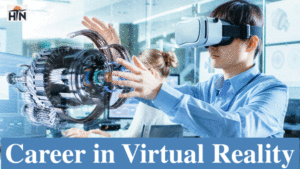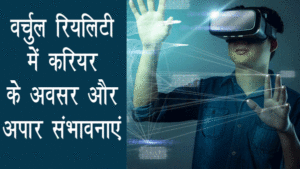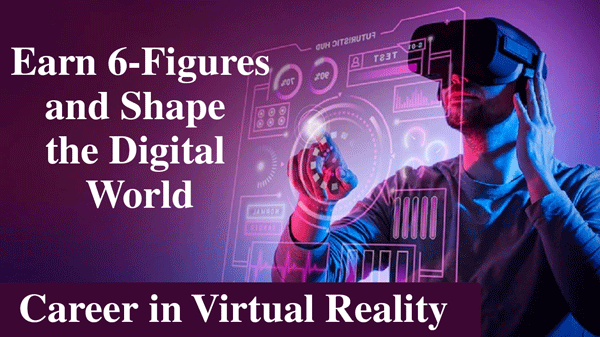Career in Virtual Reality has become a reality, not just a futuristic idea. It’s used in many areas, from games and entertainment to education and healthcare. A Career in Virtual Reality offers a unique opportunity to be at the forefront of technological innovation. By combining technical skills, creativity, and a passion for the digital world, you can carve out a rewarding and fulfilling path in this exciting field.
Whether you’re interested in developing immersive games, designing breathtaking virtual environments, or exploring the educational potential of VR, there’s a place for you in this rapidly growing industry. Career in Virtual Reality are becoming increasingly sought after as businesses and individuals recognize the transformative power of VR technology. If you’re looking for a challenging and rewarding career that allows you to make a real impact, consider pursuing a VR career.
VR immerses users in a simulated environment, creating a sense of presence through sight, sound, and sometimes even touch. This technology has applications across various sectors, including gaming, education, healthcare, architecture, and more.
Career Paths in Virtual Reality
-
VR Developers
- Role: Design, develop, and maintain VR applications and experiences.
- Skills: Programming languages (C#, C++, Unity, Unreal Engine), 3D modeling, game development, user experience (UX) design.
- Career Paths: Game development, education technology, architectural visualization.
-
VR Designers
- Role: Create immersive and engaging VR environments, user interfaces, and interactions.
- Skills: 3D modeling, graphic design, UX/UI design, storytelling, understanding of human-computer interaction.
- Career Paths: Game development, architectural visualization, theme park design.

-
VR Content Creators
- Role: Develop content for VR experiences, including 360-degree videos, animations, and interactive narratives.
- Skills: Video production, animation, storytelling, content strategy.
- Career Paths: Filmmaking, journalism, marketing, education.
-
VR Hardware Engineers
- Role: Design and develop VR hardware components, such as headsets, controllers, and sensors.
- Skills: Electronics engineering, mechanical engineering, optics, human-computer interaction.
- Career Paths: Technology companies, research institutions, hardware manufacturing.
-
VR Educators and Trainers
- Role: Develop and deliver VR-based training programs and educational content.
- Skills: Subject matter expertise, instructional design, technology integration.
- Career Paths: Education institutions, corporate training, healthcare training.
Skills Essential for a Career in Virtual Reality

- Technical Skills: Programming, 3D modeling, game development, UX/UI design.
- Creative Skills: Storytelling, visual design, animation.
- Problem-Solving Skills: Ability to overcome technical challenges and create innovative solutions.
- Collaboration Skills: Working effectively in teams, especially in interdisciplinary projects.
Future- Career in Virtual Reality
VR is poised to revolutionize various industries. As technology continues to advance, we can expect to see even more immersive and realistic experiences. Potential future applications include virtual tourism, remote work, and medical simulations.
Conclusion
The field of VR offers exciting career opportunities for individuals with a passion for technology, creativity, and innovation. Whether you’re interested in development, design, content creation, hardware engineering, or education, VR provides a diverse range of paths to explore. By acquiring the necessary skills and staying updated on industry trends, you can position yourself for a rewarding career in this rapidly evolving field.
Hindi News से जुडे अन्य अपडेट हासिल करने के लिए हमें Facebook और Twitter पर फॉलो करें।





Leave a Reply